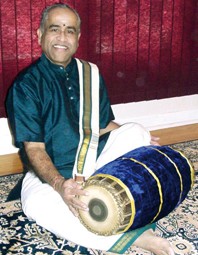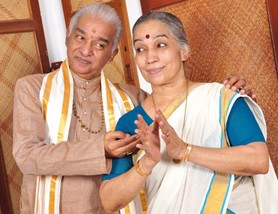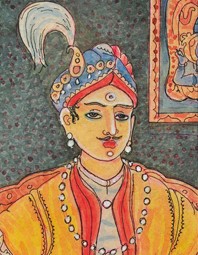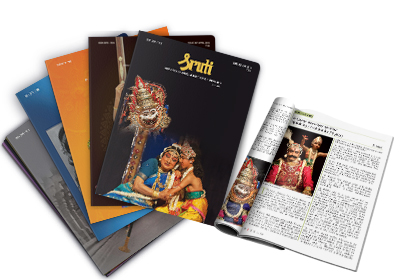COVER STORY - Scholar vidwan extraordinaire by V. Ramnarayan

The mridanga vidwan is a picture of dignity and controlled rage. He brings his tani avartanam – at the conclusion of Sanjay Subrahmanyan’s expansive main kriti – to an abrupt halt, and sits ramrod straight, expressionless, but quiet like a volcano about to erupt, as an eminently visible portion of the audience at the Music Academy begins an exodus.
The silence, deadly as it is, does not deter the army of deserters striding purposefully towards the exotic delights awaiting them outside. The percussionist waits till the last of the offenders stops polluting the air inside the auditorium, and then gives his instrument a magnificently resounding slap. The thunderous ovation that greets the symbolic gesture of disapproval rooted in the moral high ground prefaces a brilliant tani by Trichy Sankaran and his fellow percussionist. The applause restores your faith in the listeners – at least those that stayed back.
SPECIAL FEATURE - Dance as a way of life by Sujatha Vijayaraghavan

As I go backstage to see if the artists are all ready, I am surprised to find V.P. Dhananjayan going through the rigorous warm up exercises, mandi adavu-s, jumps and leaps. A few feet away Shantha is going through her exercises. This is just minutes before the curtain went up for their presentation of the Ramayana varnam for the thematic dance festival Kavya Bharatham of Natyarangam. One more instance of their total dedication to the art, I make a mental note.
I am reminded of Arjuna’s query to Krishna, “How does the man firm in wisdom speak, sit, walk?” Over the decades of my interaction with the Dhananjayans, I have had glimpses of the manner in which they speak, sit and walk.
“You cannot come dressed like this even to a dance theory class,” Dhananjayan admonishes a student who turns up in faded jeans, crumpled top, unkempt hair and a general state of dishabille. The couple is particular that the students are well groomed in their rehearsal costumes and present a neat and tidy appearance at all times.
VEDAVALLI SPEAKS - Sanskrit compositions in Carnatic music (Part 4)

We now come to the post-Trinity composers who have diligently taken up the responsibility of continuing the Carnatic music tradition that was at its peak in the period of the Trinity. In the midst of many political and socio-economic upheavals they have, through their tireless efforts and valuable contributions, passed on this great tradition, for future generations to learn and imbibe. Each has embellished it in his own way.
Sanskrit was one of the popular languages during the time of the Trinity, and hence, it is not surprising that they were proficient in it. But with the growing influence of the English language in the 20th century, there was a decline in the
prominence and popularity of Sanskrit. Nevertheless, the post-Trinity composers were also great masters of Sanskrit and composed beautiful songs in the language.
DEBATE - Myths and misconceptions by Chitravina N. Ravikiran
Oothukadu Venkata Kavi needs no introduction to Carnatic music lovers across the world. As Semmangudi Srinivasa Iyer wrote, “His works are comparable to the output of the hallowed music Trinity – Tyagaraja, Dikshitar and Syama Sastry”. While much of the music world has been soaking in the brilliant, scholarly and imaginative works of Oothukadu Venkata Kavi, some artists and musicologists have expressed doubts about whether these were by a real person who lived around the 1700s. In the 1940s and 1950s, this was understandable and even justified – since not much had been heard or written about Venkata Kavi in mainstream music circles till then.
Till almost my 18th year, the only Oothukadu song in my repertoire was Alai payude Kanna, an abysmal record considering I had learnt over 1000 compositions of other composers fairly early on. However, around 1985, I learnt from veteran jalatarangam exponent Seetha Doraisamy that Venkata Kavi had composed Kamakshi Navavarana kriti-s, Saptaratna kriti-s and numerous other kriti-s in Sanskrit. I requested her and her daughter Visalakshi to sing some of these. It was immediately obvious to me that here was a treasure trove of glittering compositions of solid substance hardly known in mainstream music, even though they were common in bhajana, Harikatha and other circles.


